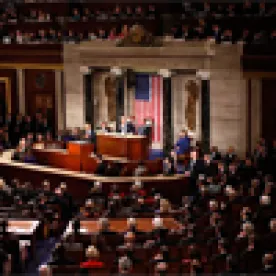JASTA – Bill Sent to President. The House voted by voice vote last Friday to advance the Senate-passed JASTA measure to President Obama’s desk for signature into law. Congress acted on a measure that many believe is long-overdue for the victims of the 9/11 attack just ahead of Sunday’s 15th anniversary of the terrorist attack. JASTA would create a narrow exception to sovereign immunity, potentially providing legal recourse for U.S. citizens against states who sponsor or enable terrorist attacks on U.S. soil.
The White House has previously signaled that President Obama would likely veto S. 2040, citing sovereign immunity concerns, among other reasons. His potential opposition sets the stage for the first congressional override of a veto during President Obama’s time in office. Senator Charles Schumer (D-New York) and Congressman Peter King (R-New York) have indicated that a sufficient number of lawmakers in each chamber – two-thirds – support an override.
North Korea – U.S. Condemns New Nuclear Test. North Korea claimed last Friday that it had successfully conducted its fifth underground nuclear test, estimated to have an explosive power of 10 kilotons and which resulted in resounding condemnation from world leaders. Upon his return from the East Asia Summit, President Obama said:
To be clear, the United States does not, and never will, accept North Korea as a nuclear state. … Today’s nuclear test, a flagrant violation of multiple UN Security Council Resolutions, makes clear North Korea’s disregard for international norms and standards for behavior and demonstrates it has no interest in being a responsible member of the international community.”
President Obama also consulted with South Korean President Park Geun-Hye and Japanese Prime Minister Shinzo Abe, saying:
We agreed to work with the UN Security Council, our other Six-Party partners, and the international community to vigorously implement existing measures imposed in previous resolutions, and to take additional significant steps, including new sanctions, to demonstrate to North Korea that there are consequences to its unlawful and dangerous actions.”
Senate Foreign Relations Committee Chairman Bob Corker (R-Tennessee) issued a statement after the nuclear test reiterating that Congress passed bipartisan sanctions legislation earlier this year targeting North Korea:
While other steps may be necessary, unless the United States, China and the United Nations Security Council are willing to immediately begin stepping up strong enforcement of the sanctions regime already in place, North Korea will ultimately achieve its goal of becoming a full-fledged nuclear power.”
Iran – Congressional Scrutiny Continues. On 6 September, Senator Marco Rubio (R-Florida) introduced the No Ransom Payments Act (S. 3285), a bill that would generally prohibit payments to Iran from the U.S. Treasury Department’s Judgment Fund until Iran: (1) returns the first $400 million it received from the United States, argued by some to have been a ransom payment; and (2) compensates U.S. plaintiffs awarded judgments against or otherwise entitled to compensation from Iran under U.S. law. Congressman Mike Pompeo (R-Kansas) introduced a companion measure (H.R. 5940) in the House on the same day.
At a House Financial Services Subcommittee on Oversight and Investigations hearing last week, some Members questioned the U.S. payments made to Iran as the Joint Comprehensive Plan of Action (JCPOA) was being negotiated and implemented. One panelist suggested Congress should consider legislation to increase transparency and accountability of any future financial transactions with states designated as sponsors of terrorism.
On Wednesday, 14 September, the House Foreign Affairs Committee is scheduled to mark-up H.R. 5931, the Prohibiting Future Ransom Payments to Iran Act, a measure introduced by Chairman Ed Royce (R-California) on 6 September.
TPP – Ryan Says Congressional Support Lacking. Speaker Ryan provided a blunt assessment of the lack of congressional support for TPP last week:
If you bring it [TPP implementing legislation] up, it’s going to go down. … I don’t think we should bring up a bill that goes down.”




 />i
/>i

